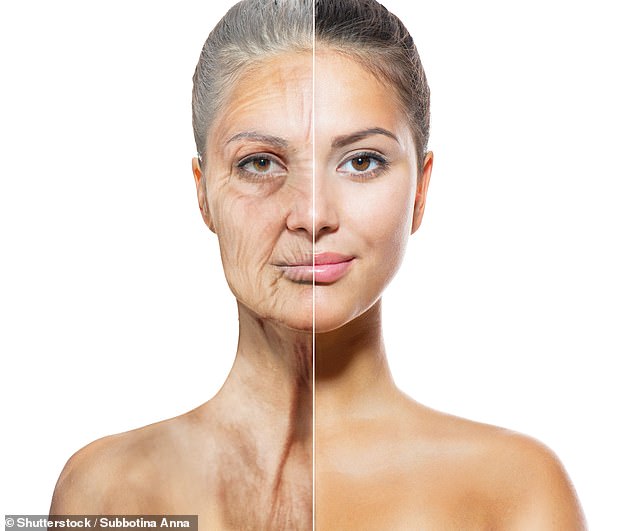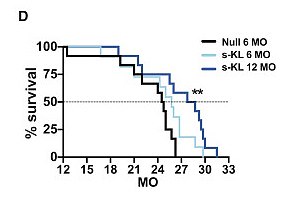Scientists Unveil Life-Extending Vaccine Duo That Could Add 16 Years and Reverse Brain Aging
- EXPLORE FURTHER: Consuming snacks daily may elevate the risk of cancer and cardiovascular events.
Researchers have moved nearer to developing an "elixir of life" therapy that might enable people to reach, and even exceed, their 90s.
The injections involve the 'anti-ageing molecule' klotho, a type of protein that is naturally produced by the body.
The levels of klotho, named after the mythical Greek figure Clotho, who spins the thread of human life, decrease naturally as we grow older.
This process occurs at the same time we start experiencing age-related maladies like weaker bones, loss of muscle mass and declining cognitive abilities.
Now, Spanish scientists have developed a klotho-based treatment that both increased levels of the protein in mice and boosted the lifespan of the rodents by a fifth.
The experts said this is the equivalent of adding an extra 16 years to an 80 year-old human's lifespan.
These mice not only had extended lifespans but also exhibited enhanced muscle strength, increased bone density, and better brain function.
While further research is needed before the treatment can be trialled on humans, the authors of the new study claim it could make a massive contribution to improving the ageing process.

In the research paper, which appeared in the journal Molecular Therapy , researchers from the University of Barcelona employed a custom-modified virus to transport klotho into the mice’s cells.
This benign virus contained the genetic instructions for cells to manufacture the protein, allowing the mice to increase their klotho levels over an extended duration.
The mice received the virus through two administrations—one intravenous injection in the body and another direct injection into the brain.
This enabled it to bypass the natural barrier that normally protects the vital organ and allowed scientists to examine klotho's effect on the brain.
Altogether, three sets of mice underwent testing.
The first group was treated when they were six months old, the second group received the dosage when they reached twelve months, and a third set of six-month-old mice was administered a placebo to serve as a control.
The male mice that received injections at 12 months of age lived the longest, with an average lifespan of 31.5 months, which is approximately one-fifth more than the control group that survived for 26.3 months on average.
A typical mouse has a lifespan of about 12 to 18 months.
The study found that klotho levels were greatest in the creatures that received injections when they were one year old.

The researchers likewise evaluated the physical capabilities of the mice and discovered that those in the treatment group exhibited superior performance in tests assessing coordination and muscle strength.
The tissue analysis indicated that the mice treated with klotho exhibited reduced internal scarring within their muscle tissues and were overall more robust.
However, female mice undergoing the treatment did not experience the same increase in lifespan because of significant health issues that researchers stated were unrelated to the treatment itself.
However they did develop stronger bones.
The examination of brain tissue revealed that male and female mice exhibited indications that they were generating fresh neurons in the hippocampus, a region of the brain strongly associated with learning.
This implies that the treatment might help fight against age-related dementia.
At present, the applications of this treatment for use in humans are still restricted.
Mice are not human beings, and numerous medications and therapies that appeared promising in rodent tests have failed to show similar effectiveness when applied to humans.
It should also be mentioned that many of the tissue samples utilized in the analysis were sourced from a small group of rodents, ranging from three to four individuals. This limitation might affect the outcomes of the study.
Joan Roig-Soriano, a neuroscience specialist and author of the recent study, noted that methods capable of delivering klotho to humans are already at our disposal.
"We currently possess viral vectors capable of reaching the brain when injected into the bloodstream, making it simpler to transition this treatment safely to human use," he stated.
He mentioned another approach could involve delivering the protein directly as a medication rather than employing viral vectors. However, they still require finding an effective method for delivery and ensuring it arrives at the intended organs.
Prior studies have demonstrated that klotho is capable of enhance cognitive abilities in elderly primates and 'de-age' The brains of mice over decades.
Initially identified by Japanese scientists, Klotho was found to influence the lifespan of mice through the varying amounts produced within them.
Read more
Post a Comment for "Scientists Unveil Life-Extending Vaccine Duo That Could Add 16 Years and Reverse Brain Aging"